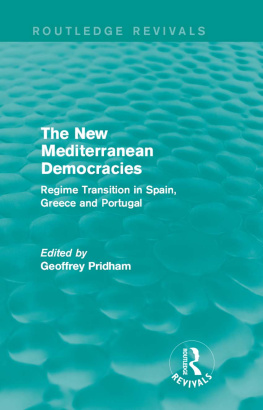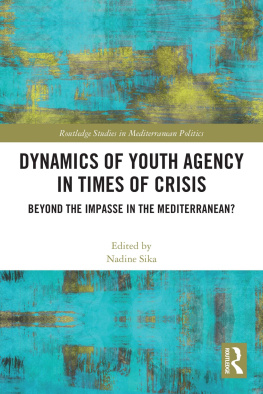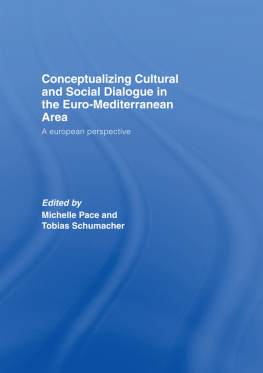ROUTLEDGE LIBRARY EDITIONS: SOCIAL AND CULTURAL ANTHROPOLOGY
Volume 5
PEOPLE OF THE MEDITERRANEAN
People of the Mediterranean
An essay in comparative social anthropology
J. Davis
First published in 1977 by Routledge & Kegan Paul Ltd
This edition first published in 2016
by Routledge
2 Park Square, Milton Park, Abingdon, Oxon OX14 4RN
and by Routledge
711 Third Avenue, New York, NY 10017
Routledge is an imprint of the Taylor & Francis Group, an informa business
1977 J. Davis
All rights reserved. No part of this book may be reprinted or reproduced or utilised in any form or by any electronic, mechanical, or other means, now known or hereafter invented, including photocopying and recording, or in any information storage or retrieval system, without permission in writing from the publishers.
Trademark notice: Product or corporate names may be trademarks or registered trademarks, and are used only for identification and explanation without intent to infringe.
British Library Cataloguing in Publication Data
A catalogue record for this book is available from the British Library
ISBN: 978-1-138-92596-0 (Set)
ISBN: 978-1-315-68041-5 (Set) (ebk)
ISBN: 978-1-138-92858-9 (Volume 5) (hbk)
ISBN: 978-1-315-68155-9 (Volume 5) (ebk)
Publisher's Note
The publisher has gone to great lengths to ensure the quality of this reprint but points out that some imperfections in the original copies may be apparent.
Disclaimer
The publisher has made every effort to trace copyright holders and would welcome correspondence from those they have been unable to trace.
People of the mediterranean
An essay in comparative social anthropology
J.Davis
First published in 1977
by Routledge & Kegan Paul Ltd
39 Store Street,
London WC1E 7DD,
Broadway House,
Newtown Road,
Henley-on-Thames,
Oxon RG91EN
and
9 Park Street,
Boston, Mass. 02108, USA
Set in Times Roman
and printed in Great Britain by
Weatherby Woolnough,
Sanders Road, Wellingborough,
Northamptonshire
J. Davis 1977
No part of this book may be reproduced in any form without permission from the publisher, except for the quotation of brief passages in criticism
ISBN 0 7100 8412 9
This is a book which surveys and compares the materials collected and published by anthropologists who have worked in the mediterranean. It is chiefly concerned with the work of the last thirty years and is thus a product in which many living colleagues have unwittingly collaborated. Such merits as it may possess are the product of several years of contemplation of their merits; most of its defects are those of the author, although there are also those common to the field as a whole. One or two writers are none the less criticised with a persistence which a public acknowledgment of respect is unlikely to soften: other readers will see that no negligible person is harried.
Some colleagues have been generous enough to collaborate wittingly: Dr Peter Loizos has read most of this book at one or another stage in its preparation, has listened with true friendliness to incoherent attempts to explain perplexity and has been unfailingly wise and constructive in criticism. Dr Nevill Colclough kindly applied his acutely sceptical intelligence to some of the wilder excesses which appeared in the drafts, and may recognise that they have been modified with his help. Professor Lucy Mair read . Mr John Goy prepared the index, and Miss Sally Hewett turned a messy manuscript into a typescript which delighted the publisher. All of these are owed more than thanks, and a relationship of continuing indebtedness is hereby acknowledged.
Reine Didon Carthage
J. Davis July 1975
This book is dedicated to the memory of Maurice Freedman, teacher, exemplar of academic and public virtue, untimely dead
Introduction
The mediterranean attracted anthropologists almost before any other region of the world. Maine, Fustel de Coulanges, Robertson-Smith, Frazer, Durkheim, Westermarck - the roll-call of those early generals marks out mediterranean anthropology as a special case: does any other region boast such a field-staff, so distinguished by their contemporaries? One reason they were attracted was the wealth of accessible information and subsequent literary, archaeological, legal, historical scholarship which made it possible to study mediterranean institutions without visiting the mediterranean: of those men only Durkheim and Westermarck were chiefly concerned with the living, and only Westermarck visited his southern contemporaries to conduct his inquiries en poste. Although Mauss visited Morocco and took an interest in what ethnographers were doing there (1930) his major works refer only to classical sources. Men whose understanding of classical or semitic antiquity was of the highest order regarded their southern contemporaries as a source of charming anecdotes or as survivals (e.g. Myres, 1905, 1933, Casson, 1938).
Nevertheless, a consequence of that early interest is that the analysis of mediterranean institutions produced seminal ideas that have influenced the analysis of more remote societies, even if anthropologists in the late twentieth century are not always aware that this is so. Of course, Maine's general statement that progressive societies move from status to contract will probably be identified by most readers as based on the study of ancient mediterranean law; but would the same readers be able to trace the theory of segmentary organisation back to of De Ia division du travail social, to produce his theory of segmentary solidarity - whence it passed into the common currency of anthropology.
Mediterranean anthropology is not merely an intellectual quartermaster's stores, however, for it is also a museum of research strategies. Maine, Fustel de Coulanges, Robertson-Smith, each compressed an eclectic set of evidences, relating to a considerable span of time, to produce an account of some aspect of the structure of a time-island, a period of the past in which change might occur but which was regarded as more or less discrete. Frazer marshalled evidence to produce a generalised account of the fundamental processes of all human society. True, he mixed evidence from the mediterranean, as Ferguson and Millar had done before him, with evidence from other parts of the world but he began and ended in those fearful woods outside Rome where, incidentally, the walls of the temple of Diana now enclose several market gardens. Durkheim, although prepared to discuss living people, relied on his scouts in the field (and they included military men) to provide him with the data which he then analysed so brilliantly. Westermarck, unique among these early men, lived for some decades in the Villa Westermarck in Tangier and with the recognised aid of local assistants (one of whom was decorated at Westermarck's insistence by the President of Finland for his services to scholarship) conducted extensive inquiries each summer. In complete contrast to Durkheim, Westermarck performed almost no analysis on the data he collected: they are presented as a list of customs and beliefs on particular topics as they may be found in nearly every Moroccan group which claims a separate identity. His books read like a territorially restricted Frazer, but without the impetus given by that writer's preoccupation with the dark rituals at Nemi. On Westermarck, Berque's judgment is definitive: his works he says, 'ont inspires aux chercheurs plus jeunes la fois admiration, dfiance et lassitude' (1955: 129). Fieldwork so prolonged was never so wasted. The two strategies - of structural analysis and of fieldwork - were to be combined elsewhere in other fields, but mediterranean anthropology is an almost complete museum of pre-modern research techniques.








